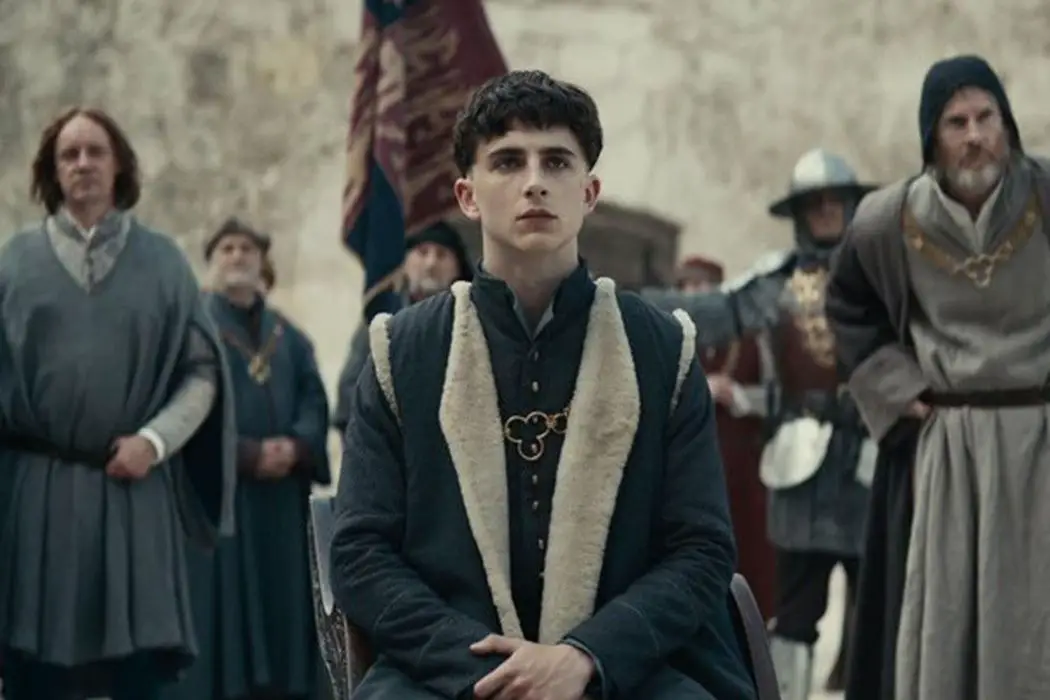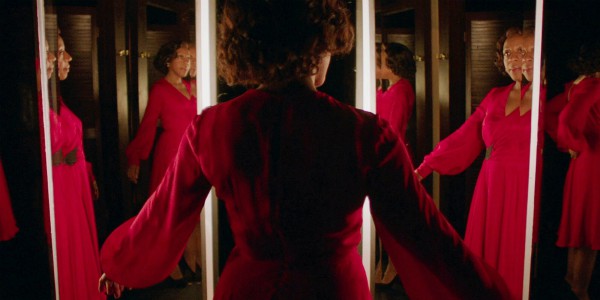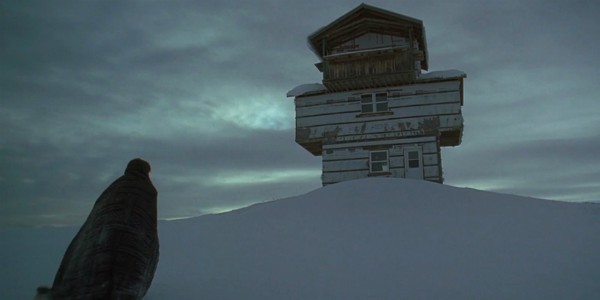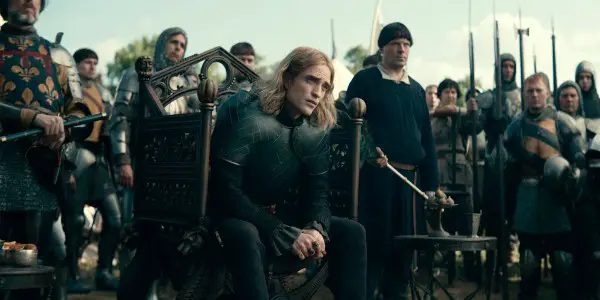SCAD Savannah Film Festival: Late Night Screenings Round Up

Amanda Mazzillo is a writer with an MFA in Dramatic…
Throughout the rest of my time at the SCAD Savannah Film Festival, I managed to see many different documentaries and narratives, in short and long form. Out of the screenings I saw, four of these were late night shows, chosen for darker content, and a few of these films were picked to celebrate Halloween, which occurred during the festival.
This recap focuses only on those later screenings: In Fabric, The Lodge, The King, and Parasite. As a fan of darker films and the horror genre, my excitement helped me stay awake and attend these late shows, fully welcoming the moody and atmospheric embrace of horror and films of a similarly dark nature.
In Fabric
Peter Strickland’s In Fabric is a beautiful film, which captures the aesthetic of 1970s Italian horror in every frame. Throughout the film, I was reminded of Halloween 3: Season of the Witch, which also explores consumerism, through the use of repeated segments featuring television advertisements. These influences, along with the ones more rooted in 1970s Giallo cinema, build In Fabric into the entertaining, yet heavy-handed film that it is. Even though, I loved the film, its metaphor is pushed so far to the forefront, it becomes more prominent than the horror of the piece.

I never really felt scared by this film, but in almost every scene, there was something which captured my attention. Sometimes it was the style of a shot, the use of newspaper clippings, and warped television screens, while other times it was a music queue, or a mannequin hand used as a jump scare. In Fabric is filled with strange and enticing images and moments, which I loved, but at times, I felt like the story was not strong enough to string all the memorable visuals together, especially when it came to the structure of the film.
As we see the dress go from one victim to another, I wished this could have been structured in a more fluid way. I felt disjointed as we went from one to another, but not in the intentional ways the film possessed in its visually exciting moments. In the end, In Fabric is still a constantly captivating film through its aesthetic elements, and makes for a very entertaining and engaging experience, even if it does suffer from some problems surrounding its plot, structure, and reliance on metaphor.
The Lodge
Severin Fiala and Veronika Franz’s The Lodge is a dark and atmospheric horror film, which is unrelentingly disturbing and sinister. The cinematography works to build this uniquely dark world to its conclusion. Through the entire length of the film, I never felt safe and warm. From an early, surprising and disturbing moment, the film moves forward and never stops pushing to darker and darker places.

For some, this might be too much, but the film manages to work, building suspense rather than relying entirely on cheaper jump scares. The Lodge explores themes of religion, and I like those moments, but they are never given enough weight in the film. Without these themes, the film could still end up in a very similar place.
Riley Keough’s performance shines through in all her scenes, which pushes her character to new heights, helping to make her motivations and characteristics better, even when the film doesn’t fully realize the potential from the character and Keough’s memorable performance. Jaeden Martell and Lia McHugh work well together to push the audience deeper into the story, but at times, the film focuses too much on their characters. Martell and McHugh give strong performances, but the story goes too often into their characters, pushing away the religious and cult aspects of the film.
The Lodge tells a story that we’ve seen before, but with a gothic flair, seeping through every frame. With more focus on the cult aspects, The Lodge could be a great atmospheric horror with strong visuals and performances, but its stories are not explored to their full potential. I enjoyed the film, and thought the stories were intriguing, but I left wanting more. The Lodge doesn’t answer many questions about the religious side of its story, and in part, this works, but I was left wanting answers to at least some of the questions risen by this part of the story.
The King
The King, directed by David Michôd, and written by David Michôd and Joel Edgerton, felt too long, and with only a few scenes that really stood out and kept the film flowing. While watching The King, I felt as if I was just waiting for something to happen, and not fully experiencing the world leading up to those central battles.
The tone of The King feels uneven, which brings me out of the film, especially when it goes from serious to comedic. Throughout watching, I constantly felt the slow passing of time. In addition to being tonally awkward, as the film went on, I felt it would end at multiple different places.

Timothée Chalamet’s performance isn’t strong enough to hold the entire film, and since the story is so focused on his character, his performance needed to work harder than anyone else. Robert Pattinson’s performance manages to add some life to the film, even if his role is completely secluded to the comedic tone the film takes on as it progresses. His character is supposed to be ridiculous, and he performs that beat to the fullest, but it isn’t enough to make me enjoy and appreciate the film overall.
If you are a bigger fan of the genre, there might be more to enjoy, but for me, The King felt long and tonally confused. None of the performances are bad, but Timothée Chalamet does not stand out as much as he should in this central and classic role.
Parasite
Parasite, directed by Bong Joon-ho and written by Bong Joon-ho and Han Jin-won, is a well-made, engaging, and memorable film exploring class disparity in Korea. With its darkly comedic tone, Parasite manages to entertain, while crafting a surprising and socially relevant experience.
Going into Parasite knowing as little as possible lets you become fully absorbed into the world, twisting and turning along with its remarkably crafted characters. Everything about Parasite works to create a unique world, while remaining cloaked in the harshness of reality and disparity among economic classes.

Parasite shows Korea’s economic class differences in a similar way that screwball comedies did for gender and class differences in the 1940s in America. Parasite captivates by focusing on the absurdity of economic classes, while remaining steeped in the reality of prejudice and how it bubbles to the surface over time.
Throughout watching Parasite, I was drawn in by the complex characters and their unique stories. For a film so focused on an issue such as economic disparity, the characters feel unique and well-developed, not stereotypes of their economic class, which allows these tropes to come through organically, creating a film perfectly balanced between its darkness and its comedy.
Conclusion
The SCAD Savannah Film Festival was a great experience as a film critic, as well as a SCAD student. Being able to see films within one of my favorite genres made me that much more excited to attend, and stay for these late screenings, day after day. Parasite stands out as the best film I saw out of these four late shows, but each one was a memorable experience, and more and more each day, I felt as if I truly belonged and could see myself being a film critic for years to come. Having this experience attending a festival as both a critic and a student helped me balance my worlds and find connections between the two areas in which I would love to work once I have my master’s degree.
Does content like this matter to you?
Become a Member and support film journalism. Unlock access to all of Film Inquiry`s great articles. Join a community of like-minded readers who are passionate about cinema - get access to our private members Network, give back to independent filmmakers, and more.
Amanda Mazzillo is a writer with an MFA in Dramatic Writing from SCAD and a BA in Writing & Linguistics and Film Studies minor from Georgia Southern University. She enjoys writing comedy and exploring all forms of media. Her Twitter name is a bad pun: @mazzillofirefox













